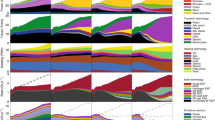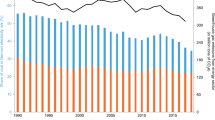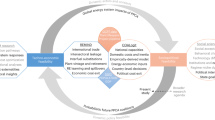Abstract
Fossil fuel market dynamics will have a significant impact on the effectiveness of climate policies1. Both fossil fuel owners and investors in fossil fuel infrastructure are sensitive to climate policies that threaten their natural resource endowments and production capacities2,3,4, which will consequently affect their near-term behaviour. Although weak in near-term policy commitments5,6, the Paris Agreement on climate7 signalled strong ambitions in climate change stabilization. Many studies emphasize that the 2 °C target can still be achieved even if strong climate policies are delayed until 20308,9,10. However, sudden implementation will have severe consequences for fossil fuel markets and beyond and these studies ignore the anticipation effects of owners and investors. Here we use two energy–economy models to study the collective influence of the two central but opposing anticipation arguments, the green paradox11 and the divestment effect12, which have, to date, been discussed only separately. For a wide range of future climate policies, we find that anticipation effects, on balance, reduce CO2 emissions during the implementation lag. This is because of strong divestment in coal power plants starting ten years ahead of policy implementation. The green paradox effect is identified, but is small under reasonable assumptions.
This is a preview of subscription content, access via your institution
Access options
Access Nature and 54 other Nature Portfolio journals
Get Nature+, our best-value online-access subscription
$29.99 / 30 days
cancel any time
Subscribe to this journal
Receive 12 print issues and online access
$209.00 per year
only $17.42 per issue
Buy this article
- Purchase on Springer Link
- Instant access to full article PDF
Prices may be subject to local taxes which are calculated during checkout



Similar content being viewed by others
References
Bauer, N. et al. CO2 emission mitigation and fossil fuel markets: Dynamic and international aspects of climate policies. Technol. Forecast. Soc. Chang. 90, 243–256 (2015).
Griffin, P. A., Jaffe, A. M., Lont, D. H. & Dominguez-Faus, R. Science and the stock market: Investors’ recognition of unburnable carbon. Energy Econ. 52, 1–12 (2015).
McGlade, C. & Ekins, P. The geographical distribution of fossil fuels unused when limiting global warming to 2 °C. Nature 517, 187–190 (2015).
Bauer, N. et al. Global fossil energy markets and climate change mitigation—an analysis with REMIND. Clim. Chang. 136, 69–82 (2016).
Fawcett, A. A. et al. Can Paris pledges avert severe climate change? Science 350, 1168–1169 (2015).
Iyer, G. C. et al. The contribution of Paris to limit global warming to 2 °C. Environ. Res. Lett. 10, 125002 (2015)..
Adoption of the Paris Agreement FCCC/CP/2015/L.9/Rev.1 (UNFCCC, 2015).
Rogelj, J., McCollum, D. L., Reisinger, A., Meinshausen, M. & Riahi, K. Probabilistic cost estimates for climate change mitigation. Nature 493, 79–83 (2013).
The Emissions Gap Report 2015 (UNEP, 2015).
Riahi, K. et al. Locked into Copenhagen pledges — Implications of short-term emission targets for the cost and feasibility of long-term climate goals. Technol. Forecast. Soc. Chang. 90, 8–23 (2015).
Jensen, S., Mohlin, K., Pittel, K. & Sterner, T. An introduction to the green paradox: the unintended consequences of climate policies. Rev. Environ. Econ. Policy 9, 246–265 (2015).
Schellnhuber, H. J., Rahmstorf, S. & Winkelmann, R. Why the right climate target was agreed in Paris. Nat. Clim. Chang. 6, 649–653 (2016).
Luderer, G., Bertram, C., Calvin, K., Cian, E. D. & Kriegler, E. Implications of weak near-term climate policies on long-term mitigation pathways. Clim. Chang. 136, 127–140 (2016).
Johnson, N. et al. Stranded on a low-carbon planet: Implications of climate policy for the phase-out of coal-based power plants. Technol. Forecast. Soc. Chang. 90, 89–102 (2015).
Sinn, H.-W. Public policies against global warming: a supply side approach. Int. Tax. Public Finan. 15, 360–394 (2008).
van der Ploeg, F. & Withagen, C. Global warming and the green paradox: a review of adverse effects of climate policies. Rev. Environ. Econ. Policy 9, 285–303 (2015).
van der Werf, E. & di Maria, C. Imperfect environmental policy and polluting emissions: the green paradox and beyond. Int. Rev. Environ. Resour. Econ. 6, 153–194 (2012).
Bosetti, V., Carraro, C. & Tavoni, M. Climate change mitigation strategies in fast-growing countries: The benefits of early action. Energy Econ. 31, S144–S151 (2009).
Blanford, G. J., Richels, R. G. & Rutherford, T. F. Feasible climate targets: the roles of economic growth, coalition development and expectations. Energy Econ. 31, S82–S93 (2009).
IAMC AR5 Scenario Database (IPCC WGIII, 2014) https://secure.iiasa.ac.at/web-apps/ene/AR5DB/.
Kilian, L. & Murphy, D. P. The role of inventories and speculative trading in the global market for crude oil. J. Appl. Econ. 29, 454–478 (2014).
Krichene, N. World crude oil and natural gas: a demand and supply model. Energy Econ. 24, 557–576 (2002).
Jakobsson, K., Bentley, R., Söderbergh, B. & Aleklett, K. The end of cheap oil: bottom-up economic and geologic modeling of aggregate oil production curves. Energy Policy 41, 860–870 (2012).
BP Statistical Review of World Energy June 2016 (British Petroleum, 2016).
Kydland, F. E. & Prescott, E. C. Rules rather than discretion: the inconsistency of optimal plans. J. Polit. Econ. 85, 473–491 (1977).
Brunner, S., Flachsland, C. & Marschinski, R. Credible commitment in carbon policy. Clim. Policy 12, 255–271 (2012).
Mertens, K. & Ravn, M. O. Measuring the impact of fiscal policy in the face of anticipation: a structural VAR approach. Econ. J. 120, 393–413 (2010).
Blyth, W. et al. Investment risks under uncertain climate change policy. Energy Policy 35, 5766–5773 (2007).
Böhringer, C., Balistreri, E. J. & Rutherford, T. F. The role of border carbon adjustment in unilateral climate policy: overview of an energy modeling forum study (EMF 29). Energy Econ. 34, S97–S110 (2012).
Global Emissions EDGAR v.4.2. (EDGAR, 2011) http://edgar.jrc.ec.europa.eu/overview.php?v=42 Accessed 25 Jan 2013.
Luderer, G. et al. Deep Decarbonization Towards 1.5 °C – 2 °C Stabilisation (Potsdam Institute for Climate Impact Research, Potsdam, Germany, 2016).
Leonard, D & Van Long, N. Optimal Control Theory and Static Optimization in Economics. (Cambridge Univ. Press, Cambridge, 1992).
Varian, H. Microeconomic Analysis. (W. W. Norton, New York, 1992).
Sinn, H.-W. Capital Income Taxation and Resource Allocation. (North Holland, London, 1987).
Gerlagh, R. Too much oil. CESifo Econ. Stud. 57, 79–102 (2011).
Bauer, N. et al. Shared socio-economic pathways of the energy sector—quantifying the narratives. Glob. Environ. Chang. 42, 316–330 (2017).
Hoel, M. & Jensen, S. Cutting costs of catching carbon—Intertemporal effects under imperfect climate policy. Resour. Energy Econ. 34, 680–695 (2012).
Colgan, J. D. The emperor has no clothes: the limits of OPEC in the global oil market. Int. Organ. 68, 599–632 (2014).
Loderer, C. A test of the OPEC cartel hypothesis: 1974–1983. J. Financ. 40, 991–1006 (1985).
Brémond, V., Hache, E. & Mignon, V. Does OPEC still exist as a cartel? An empirical investigation. Energy Econ. 34, 125–131 (2012).
Cairns, R. D. The green paradox of the economics of exhaustible resources. Energy Policy 65, 78–85 (2014).
Österle, I. The green paradox and the importance of endogenous resource exploration. Aust. J. Agric. Resour. Econ. 60, 60–78 (2016).
Bauer, N. et al. Assessing global fossil fuel availability in a scenario framework. Energy 111, 580–592 (2016).
Hoel, M. Is there a Green Paradox? CESifo Working Paper No. 3168 http://econpapers.repec.org/paper/cesceswps/_5f3168.htm Accessed 7 Jan 2014.
van der Ploeg, F. Cumulative carbon emissions and the green paradox. Annu. Rev. Resour. Econ. 5, 281–300 (2013).
Michielsen, T. O. Brown backstops versus the green paradox. J. Environ. Econ. Manag. 68, 87–110 (2014).
van der Ploeg, F. & Withagen, C. Is there really a green paradox? J. Environ. Econ. Manag. 64, 342–363 (2012).
Venables, A. J. Depletion and development: natural resource supply with endogenous field opening. J. Assoc. Environ. Resour. Econ. 1, 313–336 (2014).
Hoel, M. in Climate Change and Common Sense: Essays in Honor of Tom Schelling Ch. 11 (Oxford Univ. Press, Oxford, 2012).
Rezai, A. & van der Ploeg, F. Second-best renewable subsidies to de-carbonize the economy: commitment and the green paradox. Environ. Resour. Econ. 66, 409–434 (2017).
Acknowledgements
The authors thank O. Edenhofer, G. Klepper, K. Pittel and R. van der Ploeg for fruitful discussions. N.B. and J.H. were supported by funding from the German Federal Ministry of Education and Research (BMBF) in the Call `Economics of Climate Change' (funding code 01LA11020B, Green Paradox). The research of C.M. and P.E. forms part of the programme of the UK Energy Research Centre and was supported by the UK Research Councils under Natural Environment Research Council award NE/G007748/1.
Author information
Authors and Affiliations
Contributions
N.B. and C.M. contributed equally to this research. N.B., C.M. and J.H. set up the research design. J.H. provided data for REMIND and C.M. provided data for TIAM-UCL. N.B. analysed data. N.B. and C.M. wrote the draft of the paper. J.H. and P.E. commented on the draft.
Corresponding author
Ethics declarations
Competing financial interests
The authors declare no competing financial interests.
Additional information
Publisher’s note: Springer Nature remains neutral with regard to jurisdictional claims in published maps and institutional affiliations.
Supplementary information
Supplementary Information
Supplementary Notes 1–6, Supplementary References, Supplementary Figures 1–18 and Supplementary Table 1–2
Rights and permissions
About this article
Cite this article
Bauer, N., McGlade, C., Hilaire, J. et al. Divestment prevails over the green paradox when anticipating strong future climate policies. Nature Clim Change 8, 130–134 (2018). https://doi.org/10.1038/s41558-017-0053-1
Received:
Accepted:
Published:
Issue Date:
DOI: https://doi.org/10.1038/s41558-017-0053-1
This article is cited by
-
Sustainable electricity generation and farm-grid utilization from photovoltaic aquaculture: a bibliometric analysis
International Journal of Environmental Science and Technology (2024)
-
Recovery and utilisation of waste heat from flue/exhaust gases: a bibliometric analysis (2010–2022)
Environmental Science and Pollution Research (2023)
-
Does environmental policy stringency improve nature’s health in BRICS economies? Implications for sustainable development
Environmental Science and Pollution Research (2023)
-
Provinces with transitions in industrial structure and energy mix performed best in climate change mitigation in China
Communications Earth & Environment (2021)
-
Climate finance and disclosure for institutional investors: why transparency is not enough
Climatic Change (2020)



